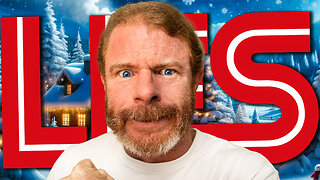Premium Only Content

Episode 2622: Audiobook Series: The Catholic Compass Part 1 of 2
Introduction: Rediscovering Our Catholic Identity
What does it mean to be Catholic today? Many Catholics struggle with this question, particularly in a world that prizes relativism over truth. The upheaval following Vatican II has left many faithful confused about their beliefs. This book seeks to strip away the modern innovations and present the faith as it was always taught without compromise or dilution.
Through these four pillars Creed, Sacraments, Commandments, and Prayer, Catholics are formed and sustained in their journey to sanctity. Each pillar is essential to building a holy life, and together, they form the unchanging framework for Catholic living. If we abandon one, the whole structure falters. This book will demonstrate how to restore these pillars in your life so you can live as a faithful Catholic, bearing witness to the truth in a secular world.
In the following pages, we will address modern challenges to these pillars and propose practical ways to live a holy life. The call to action is clear: we are all invited to holiness, equipped with the rich resources of our faith. It is my hope that this work will inspire you to deepen your understanding of what it means to be a faithful Catholic in today’s world.
Chapter 1: The Creed: The Foundation of Catholic Belief
"This is the faith of the Church. This is the faith of the apostles. We are proud to profess it, in Christ Jesus our Lord." - From the Rite of Baptism
This chapter introduces readers to the essential teachings of the Catholic faith as articulated in the Creed, providing them with the tools to resist modern errors and embrace the fullness of truth. The faith handed down from the apostles is not a relic of the past but a living reality that continues to guide the Church today.
What is the Creed?
The word “creed” comes from the Latin credo, meaning “I believe.” A creed is a formal statement of faith that defines the core beliefs of Christianity. In the Catholic Church, the two primary creeds used in liturgy and catechesis are the Apostles' Creed and the Nicene Creed.
The Apostles' Creed is a concise summary of Christian beliefs, traditionally attributed to the apostles themselves. It is often recited during private devotions, the Rosary, and Baptism, expressing the essentials of the faith: belief in God the Father, the Son, the Holy Spirit, and the Church. The Nicene Creed, on the other hand, was developed at the Council of Nicaea (325 AD) to combat the Arian heresy, which denied the divinity of Christ. This creed elaborates on the nature of Christ, the Holy Trinity, and the Church.
The creeds are safeguards of orthodoxy meaning they guard against false teachings. They provide clarity in a world where doctrinal confusion abounds. For example, the Nicene Creed asserts that Christ is "consubstantial with the Father," rejecting the notion that He is a mere creature or subordinate deity. In every era, the Church proclaims these creeds to ensure that the faithful remain grounded in truth.
Without these creeds, faith risks becoming subject to personal interpretation, leading to relativism. Just as a compass guides a traveler, the creeds guide Catholics toward salvation by providing a clear path to understanding God’s revelation.
The Nature of God and the Holy Trinity
Catholic belief begins with a central mystery: God is one in essence but three in persons Father, Son, and Holy Spirit. This doctrine, known as the Holy Trinity, distinguishes Christianity from all other religions. Each person of the Trinity is fully God, and yet there is only one God.
Modern society often distorts the doctrine of the Trinity, viewing it as symbolic or reducing it to a vague notion of love. Some even attempt to depict the persons of the Trinity as gender-neutral figures, contrary to the Church’s teaching that God revealed Himself as Father, Son, and Holy Spirit. These distortions must be resisted.
From the earliest days of the Church, the Trinity was proclaimed as a revealed truth, not a human invention. Scripture teaches us: “There are three who bear testimony in heaven, the Father, the Word, and the Holy Spirit; and these three are one” (1 John 5:7). The unity and love within the Trinity serve as the model for Christian life.
The creeds also affirm that God is the Creator of heaven and earth. He brought the universe into being from nothing, and His creation is inherently good. However, through original sin, humanity fell from grace, making redemption necessary. This reality is often denied by modern thinkers who view sin as outdated or see man as inherently good and self-sufficient. But the Church teaches that sin separates us from God, and only through His grace can we be restored.
The Incarnation and Redemption
Central to the Catholic faith is the doctrine of the Incarnation, which teaches that the Son of God took on human nature in the person of Jesus Christ. As the Nicene Creed proclaims, Christ is “true God from true God,” fully divine and fully human. His becoming man is not merely symbolic; it is a profound mystery in which the Creator enters into His creation to redeem it.
The Virgin Birth emphasizes Christ’s divine origin, as He was conceived by the power of the Holy Spirit in the womb of the Blessed Virgin Mary. Many modern theologians dismiss the Virgin Birth as myth, claiming that it is merely a metaphor for spiritual renewal. However, the Church has always affirmed the Virgin Birth as a literal, historical truth. It highlights the uniqueness of Christ’s person and mission.
The Passion, death, and Resurrection of Jesus Christ form the heart of the Gospel message. Through His death on the cross, Christ atoned for the sins of humanity. The Resurrection is the definitive proof that Jesus is the Son of God and that death has been conquered. Without the Resurrection, there is no Christianity as St. Paul writes, “If Christ has not been raised, then our preaching is in vain, and your faith is in vain” (1 Cor 15:14). Modern interpretations that reduce the Resurrection to a mere spiritual metaphor rob the Gospel of its power and deny the hope of eternal life.
The Mystical Body of Christ and the Role of the Church
The Church is not simply an organization or a human institution; it is the Mystical Body of Christ. This doctrine, rooted in St. Paul’s writings, teaches that Christ is the head of the Church, and the faithful are its members. As members of this Body, Catholics are united with Christ and one another in a supernatural bond.
Because the Church is the Body of Christ, belonging to the Catholic Church is necessary for salvation. This teaching is encapsulated in the phrase “Extra Ecclesiam Nulla Salus,” “Outside the Church, there is no salvation.” While this phrase has been misunderstood or softened in modern times, it remains an essential part of Catholic doctrine. The Church teaches that while those outside the visible structure of the Church may be saved by God’s mercy, the ordinary means of salvation is through the sacraments and faith in Jesus Christ.
How is the modern Catholic Church working against this first Pillar
Modern ecumenism often promotes the idea that all religions are equal paths to God. This is a dangerous error. While the Church calls for respectful dialogue with other religions, it cannot compromise the truth that salvation comes through Christ alone. The Second Vatican Council's openness to other faiths has led some to believe that formal membership in the Catholic Church is no longer essential a notion that contradicts centuries of teaching.
The Church’s mission is not to conform to the world but to transform it by preaching the Gospel. As St. Augustine reminds us, “The Church is not a museum of saints but a hospital for sinners.” Every Catholic is called to holiness and to bring others to the truth of the Gospel.
The Creed is the foundation of Catholic belief. It defines who God is, what He has done for humanity, and how we are to respond in faith. In a world that increasingly denies objective truth, the creeds stand as a beacon of light, guiding Catholics toward the truth revealed by God.
To live as faithful Catholics, we must know and profess the Creed with conviction. This is not a mere intellectual exercise but a response of faith and love. By embracing the Creed, we build our lives on the solid foundation of truth, which cannot be shaken by the winds of modernism and relativism.
Undermining the Foundation: How the Modern Catholic Church Works Against the Creed
The Creed stands as the unchanging foundation of Catholic belief, but in recent decades, many in the Church have deviated from its teachings. This deviation is not always overt but often takes the form of subtle shifts in theology, liturgical practice, and pastoral priorities. The current crisis in the Church stems from an erosion of the truth that the Creed safeguards. This chapter explores the ways in which modern Catholicism, influenced by relativism and modernism, has undermined the essential truths of the faith.
Distorting the Nature of God and the Trinity
One of the most concerning trends in modern theology is the watering down of the doctrine of the Trinity. In some parishes, the invocation of the Father, Son, and Holy Spirit has been replaced with ambiguous phrases such as “Creator, Redeemer, and Sanctifier.” While seemingly innocuous, these changes obscure the personal nature of the Trinity and reflect an attempt to accommodate secular ideologies, such as radical feminism, which objects to masculine terms like “Father” and “Son.”
Pope Pius X, in his encyclical Pascendi Dominici Gregis (1907), warned of the dangers of modernism, describing it as the “synthesis of all heresies.” Today, modernism continues to erode the Church’s proclamation of God’s nature by favoring vague and inclusive language at the expense of doctrinal precision. The result is a growing ignorance among Catholics regarding the Trinity, which weakens their relationship with God.
Undermining the Incarnation and Redemption
The doctrine of the Incarnation teaches that Jesus Christ is both fully God and fully man, born of the Virgin Mary by the power of the Holy Spirit. Yet, modern theologians often downplay or outright deny the Virgin Birth, suggesting it is merely symbolic rather than a literal event. This distortion attacks the heart of the Gospel, reducing Christ’s mission to a mere moral example rather than the sacrificial act of redemption.
Additionally, the Resurrection is increasingly treated as a metaphor rather than a historical reality. This trend reflects the influence of modernist theology, which emphasizes subjective religious experiences over objective truth. If Christ’s Resurrection is not real, as some theologians suggest, then the Creed becomes meaningless our faith is “in vain” (1 Cor 15:14). Unfortunately, this interpretation is sometimes promoted even within Catholic seminaries, leading priests to preach a diminished Gospel that focuses on social activism rather than the eternal destiny of souls.
Weakening the Church’s Role in Salvation
The Creed teaches that the Church is the Mystical Body of Christ and the necessary means of salvation. However, post-Vatican II ecumenism has blurred the lines between Catholicism and other religions. While respectful dialogue with other faiths is valuable, the idea that “all religions are equally valid paths to God” contradicts centuries of Catholic teaching, including the doctrine of Extra Ecclesiam Nulla Salus, “Outside the Church, there is no salvation.”
This modern ecumenical approach fosters confusion among the faithful, leading some to believe that formal membership in the Catholic Church is unnecessary. Priests and bishops sometimes emphasize interfaith unity to the extent that they downplay the unique role of the Church in God’s plan of salvation. As a result, many Catholics lack the conviction to evangelize, believing that salvation is attainable without embracing the fullness of the Catholic faith.
Liturgical Practices That Undermine the Creed
The Church’s liturgy is meant to express the truths contained in the Creed. However, post-Vatican II liturgical reforms have often resulted in practices that obscure these truths. For example, the use of horizontal, man-centered language in the liturgy shifts the focus away from the transcendent God. Similarly, the diminished emphasis on sin and repentance within the Novus Ordo Mass reflects a lack of understanding of Christ’s redemptive sacrifice.
The Traditional Latin Mass (TLM), by contrast, emphasizes the solemnity and mystery of the faith. Its prayers and gestures reflect the truths of the Creed, including the Incarnation, the Holy Trinity, and Christ’s atoning sacrifice. However, many bishops have suppressed or restricted the celebration of the TLM, despite its role in preserving Catholic orthodoxy. This suppression reflects a broader trend within the Church to prioritize innovation over Tradition, further undermining the foundation of the faith.
Pastoral Practices in Conflict with Creedal Teaching
In recent years, the Church’s pastoral approach has shifted toward a focus on accompaniment and inclusion, sometimes at the expense of proclaiming the hard truths of the Gospel. Clergy are often hesitant to preach on doctrines such as sin, judgment, and the necessity of conversion, fearing that such teachings might alienate parishioners. As a result, many Catholics lack a proper understanding of salvation and believe that a vague sense of “being a good person” is sufficient for heaven.
Furthermore, some clergy have adopted a “pastoral” approach to issues like same-sex unions, contraception, and abortion that contradicts the Church’s moral teachings. This creates confusion among the faithful, who expect clarity and consistency from their pastors. When priests and bishops fail to uphold the Creed’s teachings, they undermine the faith of their congregations and contribute to the rise of practical atheism the belief that God’s truth is irrelevant to daily life.
The Creed is the unchanging foundation of Catholic belief, but modern trends within the Church have worked against its teachings. From theological distortions of the Trinity to liturgical practices that obscure Christ’s sacrifice, the pillars of the faith have been weakened. The post-Vatican II emphasis on ecumenism and pastoral accommodation, while well-intentioned, has fostered confusion and relativism among the faithful.
To restore the Church to its foundations, Catholics must reclaim the truths of the Creed and reject the errors of modernism. This requires a return to sound catechesis, faithful preaching, and the preservation of traditional liturgical practices. The Church must once again proclaim the Creed with conviction, reminding the world that Christ alone is the way, the truth, and the life (John 14:6). Only by standing firm on this foundation can the Church fulfill her mission to bring souls to salvation.
Chapter 2: The Sacraments: Sources of Grace and Strength
"He who has My commandments and keeps them, it is he who loves Me. And he who loves Me will be loved by My Father, and I will love him and manifest Myself to him." – John 14:21
What Are Sacraments?
The sacraments are outward signs of inward grace instituted by Christ, essential to the life of the faithful. As defined by the Council of Trent, the sacraments are effective channels of sanctifying grace, meaning they not only symbolize divine realities but also confer the grace they signify. In a sacrament, God uses material elements water, oil, bread, wine to act spiritually within the recipient. These sacred rites are the means by which Christ dispenses the fruits of His Paschal Mystery to individual souls, helping them grow in holiness and remain united to Him.
The sacraments are more than rituals they are divinely instituted instruments of salvation. They restore the soul to grace, increase virtue, and prepare the faithful to receive the strength they need to live holy lives. The Catechism of the Council of Trent emphasized that without sacraments, the Christian cannot maintain the life of grace. Every sacrament imparts sanctifying grace, a share in the divine life of God, elevating the soul beyond its natural state.
Overview of the Seven Sacraments
Baptism: Gateway to the Spiritual Life
Baptism is the first sacrament, necessary for salvation (John 3:5), as it washes away original sin and infuses sanctifying grace into the soul. In traditional teaching, no soul can enter heaven without baptism. However, in recent decades, the necessity of baptism has been downplayed, even though Extra Ecclesiam Nulla Salus, “Outside the Church, there is no salvation” remains a dogma of the faith.
The traditional rite of Baptism, which includes the exorcism of the child and the blessing of salt, emphasizes the Church’s battle against Satan. This aspect of the sacrament is often omitted in modern versions, reflecting a shift away from spiritual warfare theology toward a more symbolic interpretation. The loss of these ancient prayers deprives the faithful of important sacramental protections.
Confirmation: Strengthening the Soldier of Christ
Confirmation completes the grace of Baptism, giving the recipient the Holy Spirit to strengthen them as soldiers of Christ. Traditionally, this sacrament emphasized the battle against the world, the flesh, and the devil, signifying the recipient’s duty to defend the faith.
Modern practices, however, have largely reduced Confirmation to a rite of passage, with many Catholics receiving the sacrament without proper catechesis. In some cases, the traditional understanding of spiritual warfare and the gifts of the Holy Spirit has been minimized, resulting in a generation poorly equipped to fight the battles of faith in a secular world.
Eucharist: The Source and Summit of the Christian Life
The Eucharist is the Real Presence of Jesus Christ Body, Blood, Soul, and Divinity. In the Traditional Latin Mass, the liturgy reflects the mystery and reverence of this reality, with solemnity and silence allowing the faithful to contemplate Christ’s sacrifice.
Post-Vatican II reforms introduced significant changes to the Mass, including the use of vernacular languages and the removal of altar rails, which reduced the sense of mystery surrounding the Eucharist. The practice of receiving Communion in the hand and the diminishing belief in the Real Presence are symptoms of a growing irreverence for the Blessed Sacrament. Restoring the traditional form of the Mass is essential for renewing belief in the Eucharist and ensuring that the faithful receive it with the proper disposition.
The Sacrament of Penance and the Crisis of Confession
Frequent confession is a powerful weapon against sin, yet today, the sacrament of Penance is often neglected. Many Catholics no longer see the necessity of confessing their sins regularly, and in some places, priests rarely preach about the importance of mortal sin and the state of grace. This lax attitude has led to spiritual stagnation and indifference, with many receiving the Eucharist without proper preparation.
Traditionally, frequent confession was encouraged not only for the forgiveness of mortal sins but also for the healing of venial sins. Saints like St. John Vianney, the patron saint of parish priests, often spent hours in the confessional, recognizing that confession is essential for spiritual growth. Today, the decline in the practice of confession represents a loss of awareness of the seriousness of sin and the need for repentance. Restoring the sacrament of Penance is crucial to rekindling a sense of the sacred and helping souls recover the grace lost through sin.
Marriage and the Priesthood
Marriage: Indissolubility and Openness to Life
The sacrament of Matrimony reflects the union between Christ and His Church (Eph. 5:32). It is both indissoluble and ordered toward the procreation of children. Yet, modern attitudes toward marriage have been shaped by contraception, divorce, and a loss of openness to life. Many Catholic couples approach marriage as a contract rather than a sacrament, leading to a rise in annulments and broken families. The acceptance of contraception within Catholic marriages has also weakened the understanding of marriage as a vocation ordered toward God’s will.
The Church must recover its teaching on the sanctity of marriage and promote openness to life as an essential aspect of the sacrament. As Pope Pius XI emphasized in Casti Connubii (1930), couples must recognize that marriage is a vocation in which spouses cooperate with God in creating new life and sanctifying each other through sacrifice.
Holy Orders: In Persona Christi and the Importance of Celibacy
The sacrament of Holy Orders configures a man to Christ the High Priest, enabling him to act in persona Christi in the person of Christ. Priests are called to offer sacrifice, forgive sins, and preach the Gospel, yet today the identity of the priesthood is under attack. Many modern theologians promote a reimagining of the priesthood, downplaying the importance of celibacy and questioning the all-male priesthood.
Traditional Catholic teaching holds that celibacy is a gift that conforms the priest more closely to Christ, allowing him to dedicate his entire life to the service of God. The attempt to introduce married priests or to blur the distinction between the ordained priesthood and the laity undermines the sacred nature of the priestly vocation. Restoring the traditional understanding of Holy Orders is essential for renewing the Church and ensuring that priests remain faithful to their calling.
The sacraments are the channels of God’s grace that nourish and strengthen the faithful throughout their lives. Yet, in the modern Church, many of these sacraments have been diminished or distorted, leading to a weakening of the faith. To restore the sacraments to their rightful place, the Church must return to the traditional forms and teachings that have sustained Catholic spirituality for centuries.
The faithful must rediscover the necessity of frequent confession, the reverence due to the Eucharist, and the sacrificial nature of marriage and the priesthood. By embracing the sacraments as the sources of grace and strength that they are, Catholics will be better equipped to live holy lives and defend the faith in an increasingly secular world. The path to renewal lies in reclaiming the truths that have always been at the heart of the Church’s sacramental life.
Undermining the Sacraments: The Modern Crisis in the Catholic Church
The sacraments, as outlined in traditional Catholic teaching, are essential channels of grace that sanctify and strengthen believers. However, in the wake of Vatican II reforms, the modern Church has altered sacramental practices, resulting in a loss of reverence and a dilution of doctrinal clarity. These shifts have contributed to spiritual confusion and weakened the faith of many Catholics. This section explores how the Church today has deviated from the traditional understanding and administration of the sacraments, diminishing their effectiveness in leading souls to holiness.
The Loss of Reverence for Baptism
Baptism, which removes original sin and incorporates the soul into the Mystical Body of Christ, has been trivialized in many contemporary parishes. The post-Vatican II emphasis on communal celebration has downplayed the seriousness of spiritual regeneration through the sacrament. The traditional rite included exorcisms to cleanse the soul from the influence of the devil, but these elements have been largely omitted in the revised form.
Moreover, a widespread acceptance of “baptism of desire” and “universal salvation” theology has eroded the urgency of baptizing infants promptly. In practice, many Catholics delay baptism, reflecting a weakening belief in the necessity of the sacrament for salvation, contrary to Christ’s words: “Unless one is born of water and the Spirit, he cannot enter the kingdom of God” (John 3:5).
Confirmation Reduced to a Mere Ritual
The sacrament of Confirmation traditionally marked the strengthening of baptismal grace and prepared the soul for spiritual combat, equipping the faithful as “soldiers of Christ.” Yet, in modern practice, this sacrament has become a coming-of-age ceremony, with little emphasis on its sacramental power to confer the gifts of the Holy Spirit. Catechesis is often minimal, leaving recipients unaware of the importance of Confirmation for spiritual growth.
Another major issue is that bishops, who traditionally administer Confirmation to highlight their role as successors of the apostles, now frequently delegate this responsibility to priests. This practice, though permissible in certain cases, dilutes the traditional symbolism of apostolic authority and diminishes the gravity of the sacrament.
The Crisis of the Eucharist
The Eucharist is the source and summit of the Christian life the Real Presence of Christ under the appearances of bread and wine. However, changes to the liturgy and sacramental discipline after Vatican II have weakened belief in the Real Presence. The introduction of Communion in the hand and the reduction of genuflections and other signs of reverence have fostered irreverence toward the Blessed Sacrament. Surveys show that a significant number of Catholics no longer believe in transubstantiation, the dogma that Christ is truly present in the Eucharist.
The Traditional Latin Mass (TLM), which emphasized the sacrificial nature of the Eucharist and reverence for the Real Presence, has been restricted in many dioceses, further alienating those who seek liturgical continuity. Meanwhile, the focus on “community meal” language in the post-Vatican II liturgy has contributed to the horizontal, human-centered interpretation of the Mass, rather than a focus on the vertical encounter between God and man.
The practice of allowing non-Catholics to receive Communion at ecumenical events also undermines the Church’s teaching that the Eucharist is a sign of full communion with the Catholic faith. This has blurred doctrinal lines and weakened the Church’s teaching on sacramental unity.
The Decline of Confession
The sacrament of Penance, a cornerstone of Catholic spirituality, has experienced a dramatic decline in recent decades. Many parishes offer few or no opportunities for confession, and many Catholics no longer see the need for regular reception of the sacrament. The loss of belief in mortal sin and the disappearance of discussions about Hell have led to a crisis of conscience among the faithful.
Additionally, the rise of “general absolution” services in some regions, where large groups receive absolution without individual confession, has further undermined the traditional understanding of the sacrament. These practices contradict canon law, which requires personal confession of serious sins. The spiritual consequences are severe: without regular confession, souls are deprived of sanctifying grace and risk becoming indifferent to sin.
Marriage and Holy Orders Under Attack
Marriage
The sacrament of Matrimony, instituted to reflect the union of Christ and His Church, is under siege from secular ideologies. The acceptance of contraception by many Catholics contradicts the Church’s teaching on openness to life, and the rise in annulments has contributed to the erosion of marital permanence. Pope Pius XI, in Casti Connubii, warned against the dangers of artificial birth control and the separation of the unitive and procreative aspects of marriage. Unfortunately, many modern Catholics view marriage as a contract rather than a covenant, leading to widespread divorce and family breakdown.
Holy Orders
The priesthood, configured to Christ in a unique way, is also in crisis. The emphasis on horizontal ministry has blurred the distinction between the ordained priesthood and the laity. In some dioceses, priests are treated more as administrators than as spiritual fathers. Furthermore, the push for married priests and women’s ordination contradicts centuries of Tradition. Pope John Paul II reaffirmed in Ordinatio Sacerdotalis that the Church has no authority to ordain women, but these calls persist, creating confusion among the faithful.
The mandatory celibacy of priests, a discipline that conforms the priest to the life of Christ, is also under attack. Efforts to relax this discipline risk secularizing the priesthood and diminishing the total self-gift required of priests. The priesthood’s sacred identity must be reclaimed if the Church is to restore sacramental dignity and spiritual authority.
The modern Catholic Church has, in many ways, undermined the sacraments, leaving the faithful spiritually malnourished and confused. The changes to liturgical practices, the neglect of confession, and the secularization of marriage and the priesthood have eroded traditional sacramental life. This weakening of the sacraments contributes to the crisis of faith that many Catholics experience today.
To reverse these trends, the Church must re-embrace her traditional sacramental theology and practices. The restoration of the Traditional Latin Mass, the encouragement of frequent confession, and a renewed focus on the sacredness of marriage and priesthood are essential steps toward healing the Church. The sacraments are the lifeblood of the Church, and only by restoring their rightful place can the faithful receive the grace needed to live holy and courageous lives in a secular world.
Chapter 3: The Commandments: The Moral Code for Living
"If you love me, keep my commandments." – John 14:15
God’s Law as the Path to Holiness
The Ten Commandments are the foundation of God’s moral law, given to humanity through Moses as a means to lead us to holiness. Far from being outdated relics of an ancient culture, the commandments are eternally relevant providing moral clarity in an era darkened by confusion and relativism. In a world increasingly governed by individualism and subjective morality, they stand as objective truths that guide us toward union with God and neighbor.
Each commandment reflects both natural law and divine law, revealing God’s will for human conduct. For example, the prohibitions against theft, lying, and murder align with natural reason. At the same time, commandments like the obligation to keep the Sabbath and honor God show us how to live in right worship and justice toward our Creator. The Catechism teaches that the commandments are not mere rules but signposts to freedom since true freedom is only found in obedience to God’s will.
However, modern society increasingly rejects this objective moral order, embracing instead the spirit of relativism. This mindset denies absolute truth, claiming that moral decisions depend on individual preference rather than God’s law. Pope Benedict XVI described this trend as the “dictatorship of relativism,” where there is no longer any recognition of good or evil, only shifting personal desires. The commandments remind us that morality is not subjective—it is rooted in God’s unchanging nature, who is the source of all truth.
The Precepts of the Church
In addition to the Ten Commandments, the Church provides her children with specific precepts that ensure Catholics maintain a basic level of spiritual discipline. These precepts serve as minimum requirements for living a Catholic life, helping believers grow in virtue and maintain a close relationship with God. There are five principal precepts:
• Attend Mass on Sundays and Holy Days of Obligation and rest from unnecessary work.
• Confess sins at least once a year during the Easter season.
• Receive the Eucharist at least once a year, during the Easter season.
• Observe the prescribed days of fasting and abstinence.
• Provide for the material needs of the Church according to one’s ability.
While these precepts are minimal, they are vital for nurturing the soul. In recent years, however, modern attitudes toward these obligations have grown lax. Many Catholics no longer feel compelled to attend Mass weekly, and participation in confession has dwindled. The abandonment of fasting disciplines, such as abstaining from meat on Fridays, reflects a weakening of Catholic identity and commitment to sacrifice.
The solution lies in reviving these spiritual practices with fervor. Mass attendance, frequent confession, and fasting are not burdens but acts of love and devotion to God. The precepts of the Church help remind us that our faith must involve concrete action not just personal beliefs but obedience and sacrifice.
Mortal and Venial Sin
Sin is a deliberate violation of God’s law, and it has always been understood in Catholic theology to fall into two categories: mortal sin and venial sin. Mortal sin destroys the life of grace in the soul, while venial sin wounds it. St. John tells us, “There is sin which is mortal... all wrongdoing is sin, but there is sin which is not mortal” (1 John 5:16-17). For a sin to be mortal, three conditions must be met:
• Grave matter: The action must be serious (e.g., theft, adultery, blasphemy).
• Full knowledge: The person must know that the action is sinful.
• Deliberate consent: the person must freely choose to commit the act.
Unfortunately, many Catholics today have lost a sense of sin. In a culture dominated by moral indifference, people tend to view sin as an outdated concept or dismiss it as a personal weakness rather than a serious offense against God. This has led to a decline in confession and a widespread lack of accountability. If sin is not acknowledged, neither can there be true repentance.
The Church urgently needs to recover the language of sin and repentance. Without this, there can be no genuine conversion. Confession, often called the “sacrament of healing,” must once again become a regular part of Catholic life. Priests should preach about the gravity of mortal sin and encourage the faithful to examine their consciences often, reminding them that venial sins too can accumulate and lead to spiritual decay.
Restoring Traditional Catholic Morality in a Secular World
The modern world presents Catholics with profound moral challenges. Issues such as abortion, contraception, same-sex unions, and gender ideology directly contradict the commandments and the natural law. Yet, many within the Church have either failed to address these issues clearly or have compromised with secular values.
Abortion and Contraception
The Fifth Commandment teaches that every human life is sacred. However, abortion is now accepted as a “right” in many countries, and even Catholics have become desensitized to its evil. The acceptance of contraception, condemned by Pope Paul VI in Humanae Vitae, has separated the unitive and procreative aspects of marriage, leading to family breakdown and a contraceptive mentality that rejects children as blessings from God.
Same-Sex Unions and Gender Ideology
The Sixth Commandment calls for chastity and purity in thought and deed. The acceptance of same-sex unions within some Catholic communities directly contradicts the Church’s teaching on the nature of marriage, which is ordered toward the union of one man and one woman for the purpose of procreation. Additionally, gender ideology, which denies the God-given reality of male and female, undermines the order of creation established by God.
The failure of many clergy to preach against these sins has led to confusion among the faithful. Rather than confronting the culture of death and relativism, many Church leaders have adopted a posture of accommodation. This compromises the Church’s mission to proclaim the truth with love. The faithful are left to navigate a morally hostile world without clear guidance from the pulpit.
The Role of Catholic Men and Women in Reclaiming Moral Order
A revival of Catholic morality must begin within the domestic church the family. Catholic men and women have a duty to live according to God’s commandments and to pass these teachings on to their children. Fathers, in particular, are called to lead their families in faith and to protect them from the spiritual dangers of the modern world. Mothers must cultivate a spirit of prayer, humility, and purity, embodying the virtues of Our Lady.
Parents should restore traditional devotions such as the family rosary and teach their children the importance of the commandments and the sacraments. In this way, Catholic families can become beacons of light in a world darkened by sin.
The commandments are God’s eternal moral code, given to guide us toward holiness and eternal life. Yet the modern world has rejected these truths in favor of relativism and self-indulgence. The Church must reclaim her prophetic voice and teach the faithful to live according to God’s law, even when it is difficult. The moral confusion that plagues society can only be remedied by a return to the truths of the commandments, lived out in love and fidelity to Christ. As St. John Bosco said, “Walk with your feet on earth, but in your heart be in heaven.” Only by obeying God’s law can we hope to reach the joy of heaven.
How the Modern Catholic Church Has Worked Against the Moral Code of the Commandments
"Woe to those who call evil good and good evil, who put darkness for light and light for darkness." (Isaiah 5:20)
The Ten Commandments form the foundation of Catholic morality, representing timeless truths that guide believers toward holiness. However, modern trends within the Church both in pastoral practice and moral teachings have diluted the emphasis on these commandments. This has contributed to moral relativism, weakened accountability, and fostered a crisis of faith among Catholics.
Erosion of Clear Moral Teaching
The modern Church often avoids condemning sinful behavior to appear more pastoral or inclusive. In many dioceses and parishes, the language of sin and repentance has been replaced with softer, therapeutic terms. This shift minimizes the gravity of mortal sins such as abortion, contraception, cohabitation, and same-sex unions.
In contrast, traditional Catholic teaching insists on the clarity of God’s law and the need for repentance. Many Church leaders today, however, shy away from addressing controversial moral issues directly, leaving the faithful confused about what constitutes sin. This avoidance undermines the role of confession and weakens Catholics’ understanding of the importance of living in a state of grace.
Example: Ambiguity on Same-Sex Unions
The traditional teaching of the Church holds that marriage is between one man and one woman and that any sexual relationship outside of this bond is gravely sinful. Yet, in recent years, there has been growing ambiguity. Statements from some prelates have given the impression that same-sex unions are morally acceptable as long as they are motivated by love.
Pope Francis’s remarks about "civil unions" and phrases like “Who am I to judge?” have been widely interpreted as endorsing these relationships rather than condemning the sin while calling the individual to conversion. This approach creates confusion among Catholics, weakening the commandment against impurity.
Abortion and Contraception: Silent Complicity
The proliferation of abortion and the use of contraception represent direct violations of the Fifth and Sixth Commandments Thou shalt not kill and Thou shalt not commit adultery. Traditional Catholic teaching maintains that life begins at conception and that contraception distorts the procreative purpose of marriage. Yet, the modern Church has been inconsistent in addressing these issues.
Despite the Church’s official teaching, many bishops and priests remain silent on abortion. High-profile Catholic politicians who publicly support abortion policies often receive Communion without any ecclesiastical sanction. This sends a mixed message to the faithful, undermining the gravity of the sin and the Church’s credibility.
Additionally, Humanae Vitae, the 1968 encyclical reaffirming the Church’s prohibition on artificial contraception, has been widely ignored or dismissed in modern pastoral practice. The widespread acceptance of contraception among Catholics is a direct result of the Church's failure to consistently teach and defend this teaching in the post-Vatican II era.
Neglecting the Precepts of the Church
The Precepts of the Church, which include attending Mass on Sundays, fasting, and receiving the Sacraments regularly, are practical applications of the commandments meant to guide Catholics in living out their faith. However, in recent years, these precepts have been treated as optional rather than essential.
Mass attendance has declined dramatically, and many Catholics no longer observe fasting and abstinence beyond Lent. The spirit of sacrifice and self-discipline critical to the moral life has been eroded by a culture that prioritizes comfort and convenience. Furthermore, with relaxed Sunday obligations and poorly enforced expectations for fasting, the Church has contributed to a general loss of spiritual discipline among the faithful.
Downplaying Mortal and Venial Sin
The modern emphasis on God’s mercy without accountability has led to widespread confusion about the nature of mortal and venial sins. Traditional teaching is clear that mortal sin separates the soul from God, requiring sacramental confession for reconciliation. Yet, many modern priests rarely speak about the consequences of mortal sin or the importance of frequent confession.
As a result, Catholics are less likely to confess their sins and often remain in spiritual ignorance, unaware that they are living in a state of mortal sin. The reduction of Confession to an annual obligation if practiced at all leaves many souls unprepared for Holy Communion and far from the grace necessary to lead a holy life.
Moral Relativism and Ecumenism
The rise of moral relativism within the Church has weakened traditional Catholic morality. Instead of proclaiming the absolute truth of God’s commandments, some leaders promote a relativistic approach to morality that seeks to accommodate diverse beliefs and lifestyles. This attitude is often linked to ecumenical initiatives, which prioritize unity over truth.
While the Church is called to charity toward all, it cannot compromise on moral truth. The commandments are non-negotiable and apply to every person, regardless of religious affiliation. The failure to uphold these truths in ecumenical dialogue fosters confusion and undermines the Church’s witness to the world.
The Crisis of Family Life
The family is the primary place where moral formation occurs. However, the Church’s failure to defend traditional family values has contributed to the breakdown of the family unit. Issues such as divorce, contraception, and gender ideology have infiltrated Catholic communities, leading to moral disorder and confusion.
Many dioceses and parishes have failed to uphold the Church’s teachings on marriage and sexuality, instead adopting a more permissive stance that aligns with secular culture. Programs meant to prepare couples for marriage often downplay the Church’s teaching on contraception and openness to life, leaving couples spiritually unprepared for the challenges of married life.
A Call for Moral Renewal
The modern Catholic Church has, in many ways, compromised its moral authority by failing to consistently teach and uphold the commandments. Through ambiguity, silence, and accommodation, it has allowed moral relativism to take root among the faithful. The consequences of this failure are visible in the decline of Mass attendance, weakened family life, and confusion about sin and virtue.
To restore the moral pillar of the Church, Catholics must return to the clear teaching of the commandments and reclaim accountability for their actions. The Church must re-emphasize the importance of confession, fasting, and traditional family values to foster moral renewal. As Pope John Paul II warned, “Moral truth cannot be abandoned without destroying the dignity of the human person.”
The path to holiness lies in faithful adherence to God’s law, as revealed in the Ten Commandments and upheld by the Church for centuries. It is time to rebuild the Church’s moral foundation, standing firm in the truth, even when the world and many within the Church seek compromise. Only by doing so can the faithful live in the light of Christ and lead others to salvation.
-
 LIVE
LIVE
Robert Gouveia
2 hours agoMatt Gaetz REJECTS Report, Sues Committee; Luigi Fan Club Arrives; Biden Commutes; Festivus Waste
2,602 watching -
 58:10
58:10
Kimberly Guilfoyle
4 hours agoAmerica is Back & The Future is Bright: A Year in Review | Ep. 183
15.2K16 -
 3:03:27
3:03:27
vivafrei
9 hours agoEp. 242: Barnes is BACK AGAIN! Trump, Fani, J6, RFK, Chip Roy, USS Liberty AND MORE! Viva & Barnes
52.8K21 -
 LIVE
LIVE
Dr Disrespect
7 hours ago🔴LIVE - DR DISRESPECT - MARVEL RIVALS - GOLD VANGUARD
3,480 watching -
 1:15:00
1:15:00
Awaken With JP
6 hours agoMerry Christmas NOT Happy Holidays! Special - LIES Ep 71
75.8K85 -
 1:42:21
1:42:21
The Quartering
7 hours agoTrump To INVADE Mexico, Take Back Panama Canal Too! NYC Human Torch & Matt Gaetz Report Drops!
78.9K45 -
 2:23:15
2:23:15
Nerdrotic
7 hours ago $8.26 earnedA Very Merry Christmas | FNT Square Up - Nerdrotic Nooner 453
57.3K4 -
 1:14:05
1:14:05
Tucker Carlson
7 hours ago“I’ll Win With or Without You,” Teamsters Union President Reveals Kamala Harris’s Famous Last Words
122K271 -
 1:58:31
1:58:31
The Dilley Show
7 hours ago $29.46 earnedTrump Conquering Western Hemisphere? w/Author Brenden Dilley 12/23/2024
119K27 -
 1:09:59
1:09:59
Geeks + Gamers
8 hours agoSonic 3 DESTROYS Mufasa And Disney, Naughty Dog Actress SLAMS Gamers Over Intergalactic
70.5K19